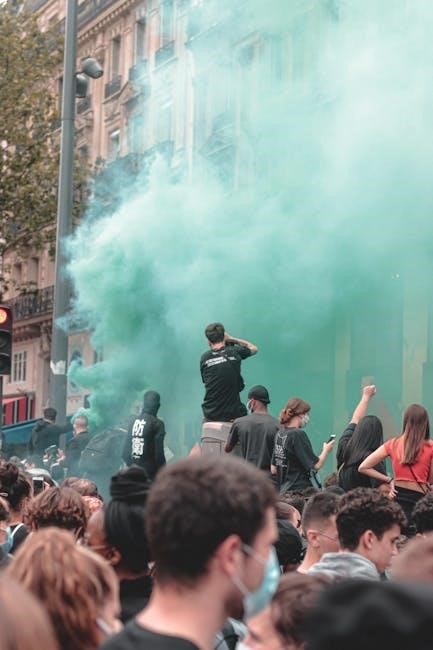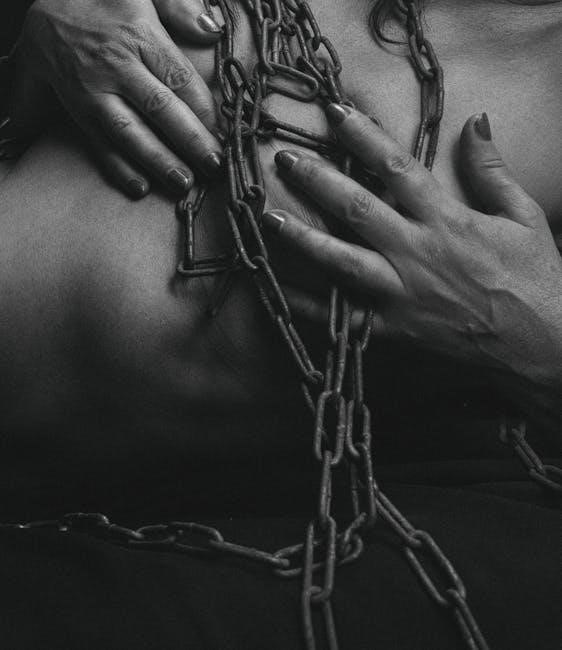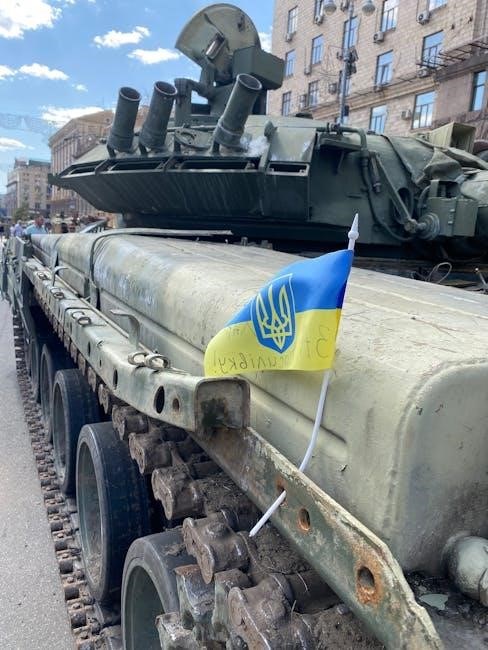The Power and Conflict Poetry Anthology is a thought-provoking collection of 15 poems exploring themes of authority, warfare, and human struggle. It is a key component of the AQA GCSE English Literature curriculum, designed to challenge students to analyze complex ideas and emotions. The anthology includes works from renowned poets such as Wilfred Owen, Alfred, Lord Tennyson, and Simon Armitage, offering diverse perspectives on power dynamics and their impact on individuals and society. By examining these poems, students gain insights into historical and social contexts, fostering a deeper understanding of human experiences and moral dilemmas.
Overview of the Anthology
The Power and Conflict Poetry Anthology is a curated collection of 15 poems that explore themes of authority, warfare, and social inequality. Designed for AQA GCSE English Literature, it challenges students to critically analyze how power dynamics shape human experiences. The anthology includes works by poets such as Wilfred Owen, Alfred, Lord Tennyson, and Simon Armitage, offering diverse perspectives on historical and contemporary issues. Poems like Exposure and Charge of the Light Brigade delve into the horrors of war, while others, such as Checking Out Me History, address identity and cultural oppression. This anthology provides a rich framework for understanding the interplay between power and conflict across different contexts, fostering analytical and comparative skills essential for academic success.
Structure of the Anthology
The Power and Conflict Poetry Anthology is structured around 15 poems thematically linked to explore power dynamics, warfare, and social inequality; Each poem is accompanied by detailed notes on meaning, form, structure, and language, providing students with a comprehensive understanding of the texts. The anthology is divided into clear sections, with poems grouped by themes such as power and corruption, war, and identity. This organization allows for easy thematic comparison, a key skill required for exam success. Additionally, the anthology includes guidance on how to approach exam questions, with tips on comparing poems and developing personal responses. The structure is supported by PDF guides, summary notes, and past papers, making it an invaluable resource for GCSE students preparing for their English Literature exams.
Key Themes and Poems
The Power and Conflict Poetry Anthology delves into profound themes such as power and corruption, war, oppression, nature, memory, and identity. Poems like “Exposure” by Wilfred Owen and “Charge of the Light Brigade” by Alfred, Lord Tennyson vividly depict the horrors of war and its impact on humanity. “Remains” by Simon Armitage and “Poppies” by Jane Weir explore the aftermath of conflict and the symbolism of remembrance. Meanwhile, “Kamikaze” by Beatrice Garland and “Checking Out Me History” by John Agard address cultural identity and personal heritage. These poems, among others, provide a rich tapestry of perspectives, enabling students to critically analyze how power and conflict shape human experiences across different contexts and generations.

Themes in the Anthology
The anthology explores power, corruption, war, nature, memory, loss, identity, and societal conflicts. These themes are interconnected, revealing how power dynamics shape human experiences and moral struggles.
Power and Corruption
The theme of power and corruption is central to the anthology, exploring how authority can lead to moral decay and exploitation. Poets such as Shelley and Blake highlight the dangers of unchecked power, while works like Charge of the Light Brigade and Remains expose the consequences of leadership failures. The anthology examines both individual and institutional corruption, revealing how pride and greed can destroy lives and societies. Historical contexts, such as monarchies and governments, illustrate the misuse of power, while nature’s enduring strength contrasts with human frailty. These poems challenge readers to question authority and reflect on the ethical implications of power, emphasizing its potential to harm when wielded irresponsibly. The theme underscores the timeless relevance of ethical leadership and accountability.
War and Conflict

The anthology delves into the devastating impact of war and conflict on individuals and society. Poems like Exposure by Wilfred Owen and Remains by Simon Armitage vividly depict the physical and emotional toll of warfare. These works highlight the futility of conflict, the loss of innocence, and the lasting scars on those involved. Charge of the Light Brigade by Alfred, Lord Tennyson, contrasts heroism with the harsh realities of battle, while Poppies by Jane Weir reflects on the legacy of war and remembrance. The poems explore both the literal battles and the metaphorical struggles, emphasizing the human cost and moral complexities of conflict. Through these works, the anthology encourages readers to reflect on the consequences of war and its enduring influence on humanity.
Oppression and Inequality
The anthology explores themes of oppression and inequality, highlighting how power imbalances affect individuals and groups. Poems such as Checking Out Me History by John Agard and The Emigrée by Grace Nichols address identity, cultural suppression, and the struggles of marginalized voices. These works emphasize how societal structures and historical injustices perpetuate inequality, often silencing or erasing certain perspectives. Other poems, like those by Simon Armitage and Jane Weir, examine how power dynamics can lead to oppression, whether through systemic control or personal experiences of marginalization. The anthology encourages readers to reflect on the ways in which inequality is maintained and challenged, offering a powerful critique of social hierarchies and their impact on human dignity. Through these poems, the theme of oppression and inequality is presented as a persistent and deeply human concern.
Nature and Humanity
The anthology examines the complex relationship between nature and humanity, exploring themes of power, control, and coexistence. Poems like Wordsworth’s The Prelude and Shelley’s The Triumph of Life depict nature as a force beyond human control, emphasizing its beauty and destructiveness. Other works, such as Owen’s Exposure, highlight the clash between human conflict and the natural world, illustrating nature’s indifference to human struggles. The anthology also explores humanity’s attempt to dominate nature, often revealing the futility of such endeavors. Through these poems, the theme of nature and humanity encourages readers to reflect on the interconnectedness of life and the enduring power of the natural world, which often surpasses human ambition and control. This duality underscores the delicate balance between existence and the environment.
Memory and Loss
The Power and Conflict anthology delves into the profound themes of memory and loss, exploring how these emotions shape human experiences. Poems such as Exposure by Wilfred Owen and Poppies by Jane Weir reflect on the lasting impact of war, where memories of loss haunt individuals and societies. The anthology examines how memories of the past, whether personal or collective, influence identity and emotions. Loss is portrayed not only as the absence of life but also as the erosion of hope and freedom. These poems highlight the emotional toll of conflict and the enduring power of memory to both heal and burden. By addressing these themes, the anthology invites readers to consider the human cost of power struggles and the lingering effects of loss on individuals and communities. This focus underscores the emotional depth of the poems and their relevance to universal human experiences.
Identity and Society
The Power and Conflict anthology explores identity and society through poems that examine personal and cultural identity, often in the context of power dynamics. Poems like Checking Out Me History by John Agard delve into the tension between personal identity and societal expectations, highlighting struggles faced by marginalized groups. The anthology also addresses how power structures shape identity, with themes of oppression and inequality reflecting societal imbalances. Poets such as Simon Armitage and Jane Weir explore how historical and cultural contexts influence individual and collective identity. These works challenge readers to consider how societal norms and power systems define and constrain identity, emphasizing the conflict between personal autonomy and external pressures. By examining these themes, the anthology provides a nuanced exploration of identity in relation to societal structures and power.

Analysis of Key Poems
The anthology features poems like Exposure and Charge of the Light Brigade, exploring war’s brutality and heroism. Remains and Poppies use nature to reflect on loss, while Kamikaze and Checking Out Me History examine cultural identity and conflict, offering diverse perspectives on power and humanity.
Exposure by Wilfred Owen
Exposure by Wilfred Owen vividly portrays the harsh realities of war, emphasizing the soldiers’ vulnerability to nature and the futility of conflict. Owen’s stark imagery and haunting tone reveal the physical and emotional toll on troops exposed to the elements. The poem highlights the powerlessness of soldiers against both nature and the war machine, challenging romanticized notions of warfare. Through evocative language, Owen conveys the dehumanizing effects of conflict, where soldiers are reduced to mere endurance. The poem’s exploration of survival and despair underscores the broader anthology theme of the devastating consequences of power and conflict on humanity. Owen’s mastery of metaphor and rhythm creates a poignant critique of war’s brutality, making Exposure a cornerstone of the anthology.
Charge of the Light Brigade by Alfred, Lord Tennyson
Charge of the Light Brigade by Alfred, Lord Tennyson, immortalizes the ill-fated cavalry charge during the Crimean War. The poem vividly captures the bravery and futility of war, exploring themes of duty, heroism, and the tragic consequences of authority. Tennyson’s use of rhythm and imagery conveys the intensity of the battle, while his portrayal of the soldiers’ obedience highlights the complex dynamics of power and conflict. The poem critiques the misuse of authority, emphasizing the human cost of decisions made by those in power. Its inclusion in the anthology underscores the enduring relevance of examining the interplay between courage, command, and catastrophe, offering a poignant reflection on the nature of warfare and its impact on humanity.
Remains by Simon Armitage
Remains by Simon Armitage is a haunting exploration of the aftermath of war, focusing on the Falklands conflict. The poem delves into themes of duty, memory, and the emotional toll of warfare on soldiers. Armitage’s vivid imagery and metaphorical language evoke the desolation and moral ambiguity of conflict, while his concise structure amplifies the poem’s intensity. The title itself reflects the physical and psychological remnants of battle, challenging readers to confront the human cost of power struggles. By blending personal narrative with universal truths, Armitage creates a powerful commentary on the enduring impact of war, making Remains a compelling addition to the Power and Conflict anthology.
Poppies by Jane Weir
Poppies by Jane Weir is a poignant exploration of memory, loss, and the enduring impact of war. The poem centers on a speaker reflecting on their father’s wartime experiences, weaving together personal and historical narratives. Weir’s vivid imagery, such as the “red crepe paper” poppies, symbolizes remembrance and the fragility of life. The poem delves into the emotional toll of conflict on individuals and families, while also highlighting the resilience of the human spirit. Through its lyrical language and structured form, Poppies captures the complexities of inherited trauma and the struggle to reconcile past and present. It is a powerful meditation on how war shapes identity and memory, leaving lasting scars that transcend generations.
Kamikaze by Beatrice Garland
Kamikaze by Beatrice Garland is a compelling exploration of sacrifice, honor, and the psychological impact of war. The poem delves into the mindset of a kamikaze pilot, examining the tension between personal conviction and societal expectations. Garland’s use of imagery and metaphor, such as the “sacred fire” and “divine wind,” underscores the cultural and spiritual dimensions of the pilot’s mission. The poem raises questions about the nature of power, duty, and the human cost of conflict. Through its nuanced portrayal, Kamikaze challenges readers to consider the complexities of warfare and the moral ambiguities faced by individuals in extreme circumstances. This thought-provoking piece invites reflection on the intersection of personal identity and societal pressure.
Checking Out Me History by John Agard
Checking Out Me History by John Agard is a powerful exploration of identity, culture, and the reclaiming of one’s heritage. The poem reflects on the speaker’s Caribbean roots and the historical narratives that have shaped their sense of self. Agard’s use of rhyme and rhythm creates a vibrant, almost musical quality, emphasizing the richness of the speaker’s cultural background. The poem challenges the dominance of Eurocentric histories, urging the reader to recognize and celebrate diverse perspectives. Through its conversational tone and vivid imagery, Checking Out Me History invites readers to reflect on the importance of personal and collective identity in understanding power dynamics and societal structures. It is a celebration of heritage and a call to reclaim one’s story in the face of historical erasure.

Comparative Analysis
The comparative analysis of poems in the Power and Conflict anthology explores how poets portray similar themes, such as power, corruption, and war, through unique perspectives and literary devices.
Comparing Poems on Power and Corruption
Poems in the anthology explore power and corruption through contrasting perspectives. The Charge of the Light Brigade by Tennyson highlights the misuse of authority during war, while Kamikaze by Beatrice Garland examines the darker side of devotion to power. Similarly, Checking Out Me History by John Agard critiques historical power imbalances. These poems reveal how power can lead to exploitation and destruction, whether through military actions, cultural manipulation, or systemic oppression. The portrayal of power varies, with some poems emphasizing its corrupting influence on individuals and others on institutions. The contrast between individual and collective experiences of power and corruption provides a rich basis for comparison, inviting readers to reflect on the ethical implications of authority and control. This thematic overlap allows for insightful analysis of how poets condemn or critique power dynamics across different contexts.
Comparing Poems on War and Conflict
Poems in the anthology depict war and conflict with vivid imagery and emotional depth. Exposure by Wilfred Owen captures soldiers’ physical and mental struggles, while Remains by Simon Armitage reflects on the aftermath of war. Both poems contrast the brutality of combat with the vulnerability of human life. Similarly, Charge of the Light Brigade by Tennyson portrays heroic sacrifice, yet subtly critiques military leadership. These works reveal the psychological and physical toll of war, offering diverse perspectives on its futility and impact. The comparison highlights how poets use language to convey the horrors of conflict, emphasizing themes of loss, survival, and the moral complexities of warfare. This allows for a nuanced exploration of how war shapes individual and collective experiences across different historical contexts.
Comparing Poems on Oppression and Inequality
Poems in the anthology vividly explore oppression and inequality, often highlighting the struggles of marginalized groups. Checking Out Me History by John Agard celebrates cultural identity while critiquing historical erasure, while Kamikaze by Beatrice Garland examines the psychological impact of societal expectations. Both poems reflect on the suffocation of individuality by oppressive forces. Similarly, Poppies by Jane Weir uses symbolism to address the suppression of women’s voices, contrasting with the overt aggression in Remains, which critiques militaristic control. These works reveal how oppression manifests in different forms, from cultural erasure to gender inequality, emphasizing the resilience of the human spirit in the face of adversity. Comparing these poems provides a powerful lens to understand the universal struggle for equality and justice.

Exam Preparation and Revision
Effective preparation for the Power and Conflict exam involves in-depth analysis of themes, poetic devices, and historical contexts. Utilize revision guides and past papers to refine essay techniques, focusing on thematic connections and comparative analysis. Allocate time to memorize key quotes and practice structuring responses to unseen questions. Regularly review notes and engage in group discussions to enhance understanding. Prioritize active learning strategies, such as creating concept maps and writing practice essays, to ensure readiness for the examination.
How to Answer the Poetry Anthology Question
To excel in answering the Power and Conflict Poetry Anthology question, focus on thematic connections and comparative analysis. Begin with a clear, focused thesis statement that links the given poem to another in the anthology. Ensure your essay structure includes an introduction, 2-3 comparative paragraphs, and a conclusion. Highlight key quotes and discuss their relevance to themes like power, corruption, or identity. Use comparative connectives such as “similarly” or “in contrast” to strengthen your analysis. Avoid memorized quotes and instead demonstrate a deep understanding of both poems. Focus on how themes and poet’s methods interconnect, rather than listing devices. Practice timing your response to meet the 40-45 minute requirement, ensuring quality and relevance in your arguments.
Revision Tips and Strategies
Effective revision for the Power and Conflict Poetry Anthology involves active engagement with the poems and their themes. Create detailed summaries and mind maps to visually connect ideas across poems. Use flashcards to memorize key quotes and their analyses, focusing on how they relate to themes like power, corruption, or identity. Practice essay questions under timed conditions to build confidence and speed. Engage in active recall by testing yourself on poem meanings and comparisons without notes. Regularly review and compare poems to identify shared themes and differences. Utilize online resources and study guides to deepen understanding. Join study groups to discuss interpretations and refine arguments. Consistency is key—set aside dedicated time daily to revise and reflect on progress. This structured approach ensures a thorough grasp of the anthology and readiness for the exam.
Key Quotes and Their Analysis
Key quotes from the Power and Conflict Poetry Anthology are essential for understanding themes and poem comparisons. For example, in Exposure, Owen writes, “We cringe in holes, and stutter through our teeth,” highlighting soldiers’ vulnerability and fear; Similarly, Tennyson’s Charge of the Light Brigade includes, “Into the valley of death / Rode the six hundred,” emphasizing heroic sacrifice and tragic loss. These quotes illustrate contrasting perspectives on war—Owen’s bleak realism versus Tennyson’s glorification. In Remains, Armitage’s “His legs: a unraveling rope” underscores the brutal consequences of conflict. Such quotes are vital for analysis, enabling students to explore themes like power, morality, and humanity. Memorizing and interpreting these quotes helps students form nuanced arguments in essays, demonstrating their understanding of the anthology’s complex ideas.
Resources and Study Guides
Online resources, PDF guides, and revision notes provide comprehensive support for studying the Power and Conflict Poetry Anthology, offering in-depth analyses and teaching materials for effective revision.
GCSE English Literature Revision Notes
GCSE English Literature revision notes for the Power and Conflict anthology are essential study aids. These notes provide detailed summaries of each poem, highlighting key themes, motifs, and literary devices. They include analysis of poems such as Exposure by Wilfred Owen, Charge of the Light Brigade by Alfred, Lord Tennyson, and Remains by Simon Armitage. Additionally, the notes offer comparative insights, helping students understand how to link poems thematically. Practical exam tips and strategies are also included, such as structuring essays, using comparative connectives, and focusing on the quality of quotes. These resources are designed to help students achieve top marks by developing a thorough understanding of the anthology and improving their analytical skills.
Online Resources and PDF Guides
Online resources and PDF guides for the Power and Conflict poetry anthology are widely available, offering comprehensive analysis and study materials. Websites like Revision World and Save My Exams provide detailed PDF guides, including summaries, thematic comparisons, and exam tips. These resources often feature in-depth analyses of poems such as Exposure, Remains, and Charge of the Light Brigade, highlighting key themes like war, power, and identity. Additionally, PDF documents from educational platforms include revision notes, past papers, and teaching resources, helping students and educators alike. These guides are invaluable for understanding the anthology’s complex themes and preparing for GCSE English Literature exams.
Teaching Resources and Lesson Plans
Teaching resources and lesson plans for the Power and Conflict poetry anthology are abundant online, catering to educators seeking engaging ways to explore the themes. Many lesson plans include starter quizzes to activate prior knowledge and activities that encourage deep thematic links between poems. Resources often feature structured guides for analyzing specific poems, such as Exposure and Remains, with a focus on themes like war, power, and identity. Websites like Save My Exams and Revision World offer downloadable PDFs with lesson ideas, while educational platforms provide adaptable teaching materials. These resources are designed to align with the curriculum, helping teachers create meaningful and interactive lessons that foster critical thinking and analysis among students.
The Power and Conflict Poetry Anthology offers profound insights into human nature, power dynamics, and moral complexities, providing a rich, thought-provoking experience for readers and learners alike.
The Power and Conflict Poetry Anthology explores themes of authority, warfare, and human resilience through 15 thought-provoking poems. It examines power dynamics, corruption, and their consequences, while also highlighting the emotional and societal impact of conflict. Poets like Wilfred Owen, Alfred, Lord Tennyson, and Simon Armitage provide diverse perspectives, offering insights into historical and contemporary struggles. The anthology challenges readers to reflect on morality, leadership, and the enduring effects of power and conflict. By analyzing these works, students gain a deeper understanding of human experiences and the complexities of power. This collection is a vital resource for GCSE English Literature studies, fostering critical thinking and emotional engagement with its themes.
Final Thoughts on the Anthology
The Power and Conflict Poetry Anthology is a profound exploration of human experiences, offering insights into the complexities of authority, warfare, and societal struggles. Through diverse perspectives, it challenges readers to reflect on the consequences of power and the emotional toll of conflict. Poets like Owen, Tennyson, and Armitage provide vivid portrayals of historical and contemporary issues, making the anthology a valuable resource for understanding universal themes. Its ability to evoke empathy and critical thinking ensures its relevance for both academic study and personal reflection. Ultimately, the anthology serves as a testament to the enduring impact of poetry in capturing the essence of human resilience and moral dilemmas, leaving a lasting impression on its readers.

Leave a Reply